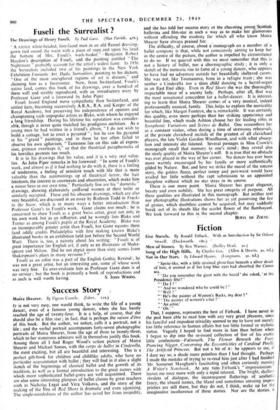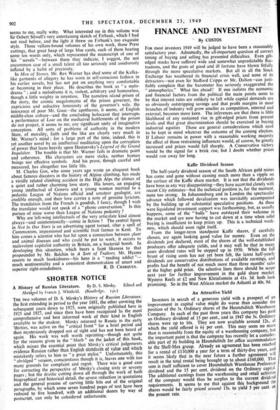Fiction
Men of Stones. By Rex Warner. (Bodley Head. 9s.)
"Sprite-like, with a little strained ghost-face beneath a silver shock of hair, it seemed as if her long blue eyes had absorbed the Cunan sea.
Do you remember the giant with the beard' she asked. ' at the Presidency fete? '
" ' Do I ? '
"' And we wondered who he could be ! '
"'Well? '
" ' He's the painter of Women's Backs, my dear l ' "'The painter of women's what?'
— An artist.'
" ' Oh.— That, I suppose, represents the best of Firbank. I have never in the past been able to read him with any very great pleasure, since his fanciful and impudent triviality seemed to me to have not merely too little reference to human affairs but too little formal or stylistic virtue. Vaguely I hoped to find more in him than before when I began to dip into the re-issued collection of five of his exotic little confections—Valmouth. The Flower Beneath the Foot. Prancing Nigger. Concerning the Eccentricities of Cardinal Pirelli. The Artificial Princess. But not a bit of it: he appears to me, if I dare say so, a shade more pointless than I had thought. Perhaps I made the mistake of trying to re-read him just after 1 had finished Mr. Somerset Maugham's fascinating and often curiously moving A Writer's Notebook. At any rate. Firbank's " impressionism leaves me once more with only a tepid interest. The bright, shallow rivulets of dialogue, the inconsequent flutterings of aesthetr: fancy, the absurd names, the bland and sometimes amusing impro• pricties are still there, but they do not, I think, make up for the imaginative incoherence of these stories. Nor are the stories. it seems to me, really witty. What interested me in this volume was Sir Osbert Sitwell's very entertaining sketch of Firbank, which I had not read before, and the light it threw on Firbank's too exquisite style. Those vellum-bound volumes of his own work, those Press cuttings, that great heap of large blue cards, each of them bearing some ten words only, which represented the manuscript of one of his " novels "—between them they indicate, I suggest, the not uncommon case of a small talent all too seriously and assiduously inflated by a habit of preciosity.
In Men of Stones, Mr. Rex Warner has shed some of the Kafka- like garments of allegory he has worn.in self-conscious fashion in his earlier novels, but has not put on anything very comfortable or becoming in their place. He describes the book as " a melo- drama " ; and a melodrama it is, violent, arbitrary and humourless, though a little weighty in intention. The nameless island prison of the story, the cosmic megalomania of the prison governor, the capricious and seductive femininity of the governor's wife, the innocence of poor Mr. Goat—the apotheosis, it seems, of English middle-class culture—and the concluding holocaust that interrupts a performance of Lear on the mediaeval battlements of the prison do not project, it seems to me, any significant unity of imaginative conception. All sorts of problems of authority in the modern State, of morality, faith and the like are clearly very much in Mr. Warner's mind ; for a large part of the time, indeed, this is yet another novel by an intellectual meditating upon the corruption of power that leans heavily upon Dostoevsky's Legend of the Grand Inquisitor. The trouble is that Mr. Warner fails in dramatic point and coherence. His characters are mere sticks, neither human beings nor effective symbols. And his prose, though careful and measured, has altogether too little life.
M. Charles Gos, who some years ago wrote an eloquent book about famous disasters in the history of Alpine climbing, has made a vividly related climbing accident in the High Alps the climax of a quiet and rather charming love story. His lovers, an engaging young intellectual of Geneva and a young woman married to a pedantic League of Nations official and amateur geologist. are credible enough, and their love carries a note of genuine lyricism. The translation from the French is goodish, I fancy, though I wish the translator would not speak of a " phone conversation." Is this purism of mine worse than League of Nations pedantry ?
Why are left-wing intellectuals of the very articulate kind almost always—and unintentionally—comic in fiction ? The central figure in Not in Our Stars is an advertising agent turned, after a spell of Communism, impassioned and scientific fruit farmer in Kent. To him comes a scientist who has hit upon a connection between plan! and animal diseases and who could be put to work, it occurs to malevolent capitalist authority in Britain, on a bacterial bomb. In developing this situation, which bears a faint likeness to that propounded by Mr. Balchin in A Sort of Traitors. Mr. Hyams resorts to much bookishness—his hero is a " reading addict "- much sentimentality and a consistent demonstration of smart and



































 Previous page
Previous page